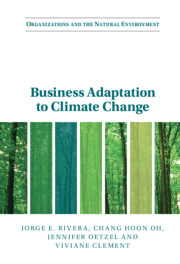Book contents
- Business Adaptation to Climate Change
- Organizations and the Natural Environment
- Business Adaptation to Climate Change
- Copyright page
- Dedication
- Epigraph
- Contents
- Figures
- Tables
- About the Authors
- Foreword
- Preface and Acknowledgments
- Publication Acknowledgments
- Part I Introduction
- Part II Conceptual Framework
- 2 Business Adaptation Limits and Resilience to Climate Change Adversity
- 3 Adaptation to Slow-Onset Nature Adversity Intensity
- 4 Can You Learn from the Second Kick of a Mule?
- 5 Disaster Experience and MNC Subsidiary Entry and Expansion
- Part III Empirical Studies of Business Adaptation to Nature Adversity
- Part IV Conclusions
- Bibliography
- Index
4 - Can You Learn from the Second Kick of a Mule?
MNCs Foreign Investment, Natural Disasters, and Country Governance
from Part II - Conceptual Framework
Published online by Cambridge University Press: 28 April 2022
- Business Adaptation to Climate Change
- Organizations and the Natural Environment
- Business Adaptation to Climate Change
- Copyright page
- Dedication
- Epigraph
- Contents
- Figures
- Tables
- About the Authors
- Foreword
- Preface and Acknowledgments
- Publication Acknowledgments
- Part I Introduction
- Part II Conceptual Framework
- 2 Business Adaptation Limits and Resilience to Climate Change Adversity
- 3 Adaptation to Slow-Onset Nature Adversity Intensity
- 4 Can You Learn from the Second Kick of a Mule?
- 5 Disaster Experience and MNC Subsidiary Entry and Expansion
- Part III Empirical Studies of Business Adaptation to Nature Adversity
- Part IV Conclusions
- Bibliography
- Index
Summary
In Chapter 4, we shift the focus of our analytical framework to the effect of natural disasters on subsidiary-level foreign direct investments by multinational corporations (MNCs). in this chapter we conceptually examine how natural disasters, compared to industrial disasters and terrorist attacks, shape MNCs foreign market entry and expansion. We also investigate whether MNC subsidiary-level investment is more likely to decrease in response to specific types of natural disasters that result in a higher number of fatalities. In addition, we also elaborate on how country institutional governance characteristics (i.e., regulatory quality, rule of law, democratic freedoms, political stability, and corruption levels) moderate the relationship between disasters and MNC subsidiary-level investment.
- Type
- Chapter
- Information
- Business Adaptation to Climate Change , pp. 62 - 78Publisher: Cambridge University PressPrint publication year: 2022

